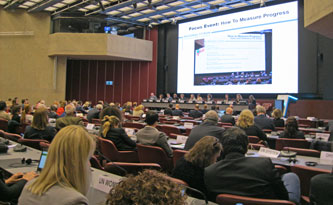UNECE Regional Forum on Sustainable Development
The IEF participated in the United Nations Economic Commission for Europe (UNECE) Regional Forum on Sustainable Development in Geneva on 21-22 March 2019, and in the Civil Society Pre-Meeting to the Forum on 20-21 March. Both Victoria Thoresen and Arthur Dahl attended the Pre-Meeting, and Arthur was accredited for IEF as one of 800 participants in the UNECE Regional Forum.

At the Civil Society Pre-meeting in the Palais des Nations, representatives from all the major groups and other stakeholders discussed the implementation and monitoring of the 2030 Agenda for Sustainable Development, the role of civil society in United Nations processes on the Sustainable Development Goals (SDGs), and joint advocacy messages that they would deliver to the intergovernmental Regional Forum. Working groups considered each of the SDGs under review this year at the High Level Political Forum (HLPF) next July, as well as the process of Voluntary National Reviews that governments prepare for presentation at the HLPF.
The Regional Forum consisted of plenary sessions, focus events for dialogues on pressing questions of "Technology, Digitalization, Artificial Intelligence - Curse or Blessing for Sustainable Development" and "How to Measure Progress? Data and Statistics for SDGs", and round tables on SDG 4 (Quality Education), SDG 8 (Decent work and economic growth), SDG 10 (Reduced inequalities), SDG 13 (Climate action), and SDG 16 (Peace, Justice and Strong Institutions).
One significant feature of the events was the strong predominance of women on the podium, with usually only one token man. The Chair of the Forum was Albanian Minister of Health and Social Protection Ogerta Manastirliu, who noted that more than half of their Cabinet was female. UNECE Executive Secretary Olga Algayerove was active throughout the forum. In her opening keynote, UN Deputy Secretary-General Amina Mohammed said that we are off track in implementing the 2030 Agenda, and more ambition is needed. With the rural/urban divide and so many unemployed young, a quarter of the region's population is are risk of poverty. The gender gap remains. Greenhouse gas emissions per capita are much higher, making it harder to meet the Paris goals. She said it was our duty to the marching children to move with greater speed.
Many government delegations shared their successes and difficulties, with progress on laws and policies, but frequent failures with implementation. Having an independent ombudsman to investigate such failures was useful. Human rights mechanisms were also helpful, since the SDGs corresponded to many human rights.
In the focus event on information technology, it was noted that half the world population is not yet on line, and reaching them would require addressing affordable access, training in appropriate skills, and building trust in the system and in the information it conveys. There was potential to promote health, reduce transaction costs, and make agriculture more efficient, but a new regulatory framework founded on ethical principles was needed to catch up with the rapidly evolving technology.
The focus event on measuring progress cited advances in opening up data bases to public access, but challenges in disaggregating data to capture the poorest, the most marginalized, children, Roma, migrants and others most often left behind. There are indicators of outcomes, but not many that measure progress to highlight where more effort is needed.
In the closing keynote, Eeva Furman of Finland gave a preview of the UN Global Sustainable Development Report to be issued on 15 May 2019, of which she is one of the principal authors. It applies systems thinking to look at SDG interactions by transnational flows. While there are many synergies between SDGs, there are also challenging trade-offs. The report will review six areas for systemic transformations: human potential and well-being, sustainable economies, energy decarbonisation and access, food and nutrition, urban and peri-urban development, and securing the global commons. It explores pathways and levers for transformation, and highlights the need for sustainability science and science capacity worldwide. This will be something to look forward to in May.

Last updated 27 March 2019
